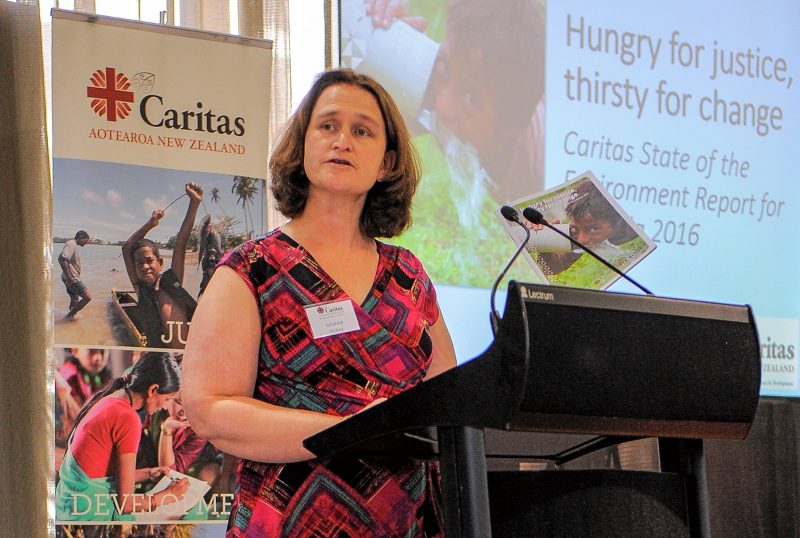Cases of children having to eat cassava roots softened with paracetamol and people dying from lack of food and clean water are among the examples of widespread hunger and thirst throughout the Pacific. Such cases are detailed in the latest Caritas State of the Environment Report for Oceania, Hungry for justice, thirsty for change.
The report, which was launched at Parliament on October 4, showed that the Pacific region’s basic food and water supplies have been severely impacted by a very strong El Nino weather pattern that has compounded the effects of serious emergencies like Cyclones Pam and Winston and the ongoing effects of climate change.
At the peak of the regional drought in summer, more than 4.7 million people were affected by food and water issues (according to the United Nations). The impact of these factors continues to be felt, especially on health, education and livelihoods.
“This is why we have shifted our assessment of the state of safe food and water supplies in Oceania to severe, up from high in 2015,” said Caritas Aotearoa New Zealand director Julianne Hickey.
“According to our partners across the region, this was the most severe El Nino drought their people had ever experienced. We heard of people walking days to get food and water in Papua New Guinea, with many becoming sick and some people dying from lack of food and access to safe drinking water.”
“In the Kimbe area of West New Britain, we heard of streams drying up, cracked soil and shrivelled coconut fruit – people could no longer make copra. Then a devastating bush fire hit that destroyed 25,000 cocoa trees,” Mrs Hickey said.
Caritas has been working with the people of Kimbe since 2009 to develop alternative cash crops to oil palm, with support from the New Zealand Aid Programme.
“Seeing their dreams go up in flames, they say ‘it was like losing a child’. But they’re not giving up – they are replanting, and looking for ways to minimise risk from future fires,” Mrs Hickey said.
This strong community resilience, coupled with a largely effective emergency response from governments and humanitarian agencies, helped to minimise loss of life and infrastructure during the El Nino drought.
This is the second State of the Environment Report for Oceania, and it once again follows how five key environmental issues are affecting people in Oceania: food and water; coastal erosion and sea level rise; offshore mining and drilling; the impact of extreme weather; and climate finance.
Produced in collaboration with Caritas Australia and Caritas Tonga, who are holding their own launches in their respective countries, the report acknowledges the historic Paris Agreement as signalling a new and unprecedented international commitment to climate change action.
However, that now needs to be backed up with concrete action and special consideration given to the needs of the most vulnerable in the region.
The report launch on October 4 was timed to coincide with the feast of St Francis of Assisi, the patron saint for ecology.
- Caritas welcomed New Zealand’s October 5 ratification of the Paris Agreement on Climate Change, one day after the Oceania environment report was launched. Mrs Hickey again called for action to back up the ratification.

Reader Interactions